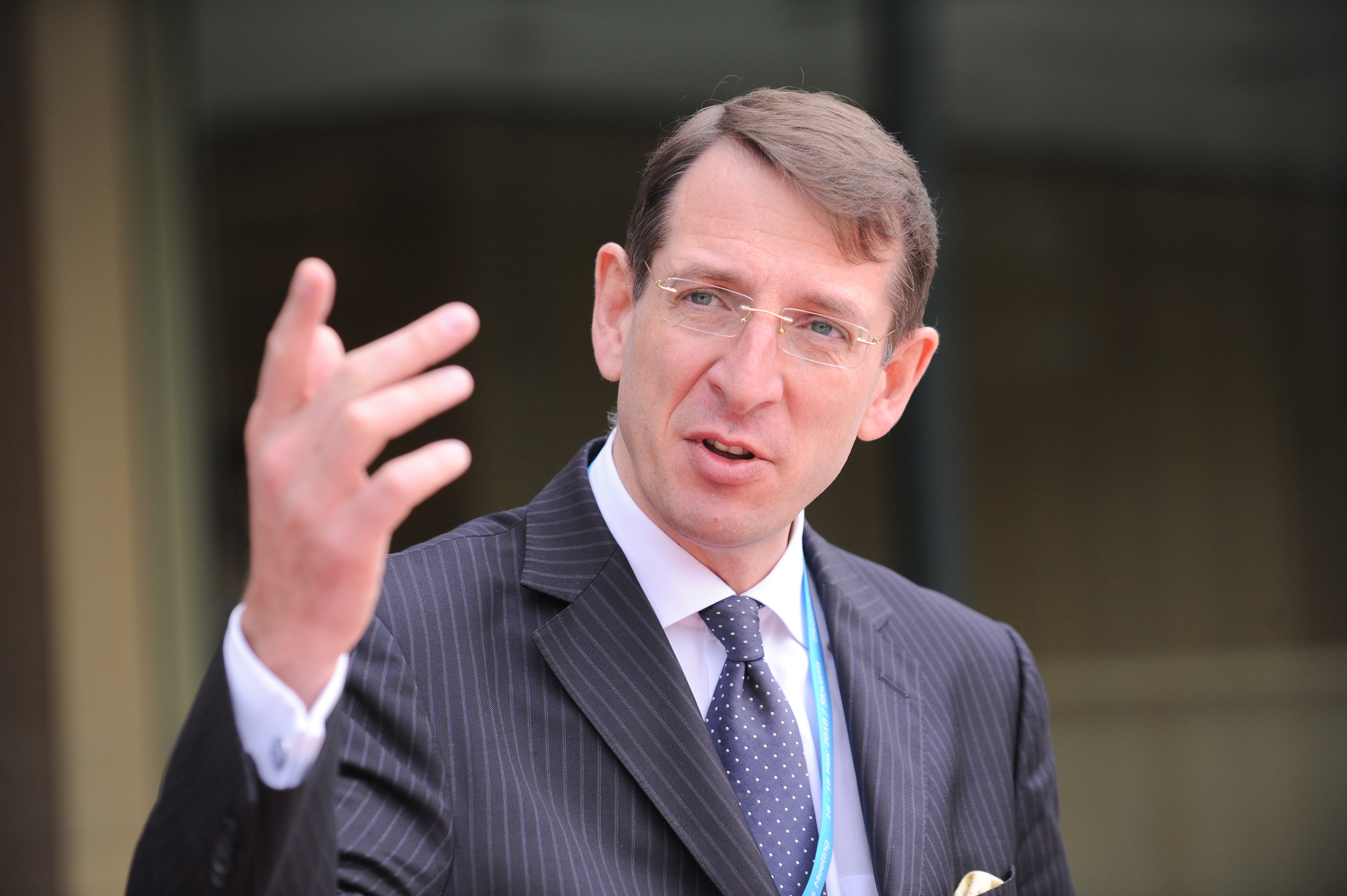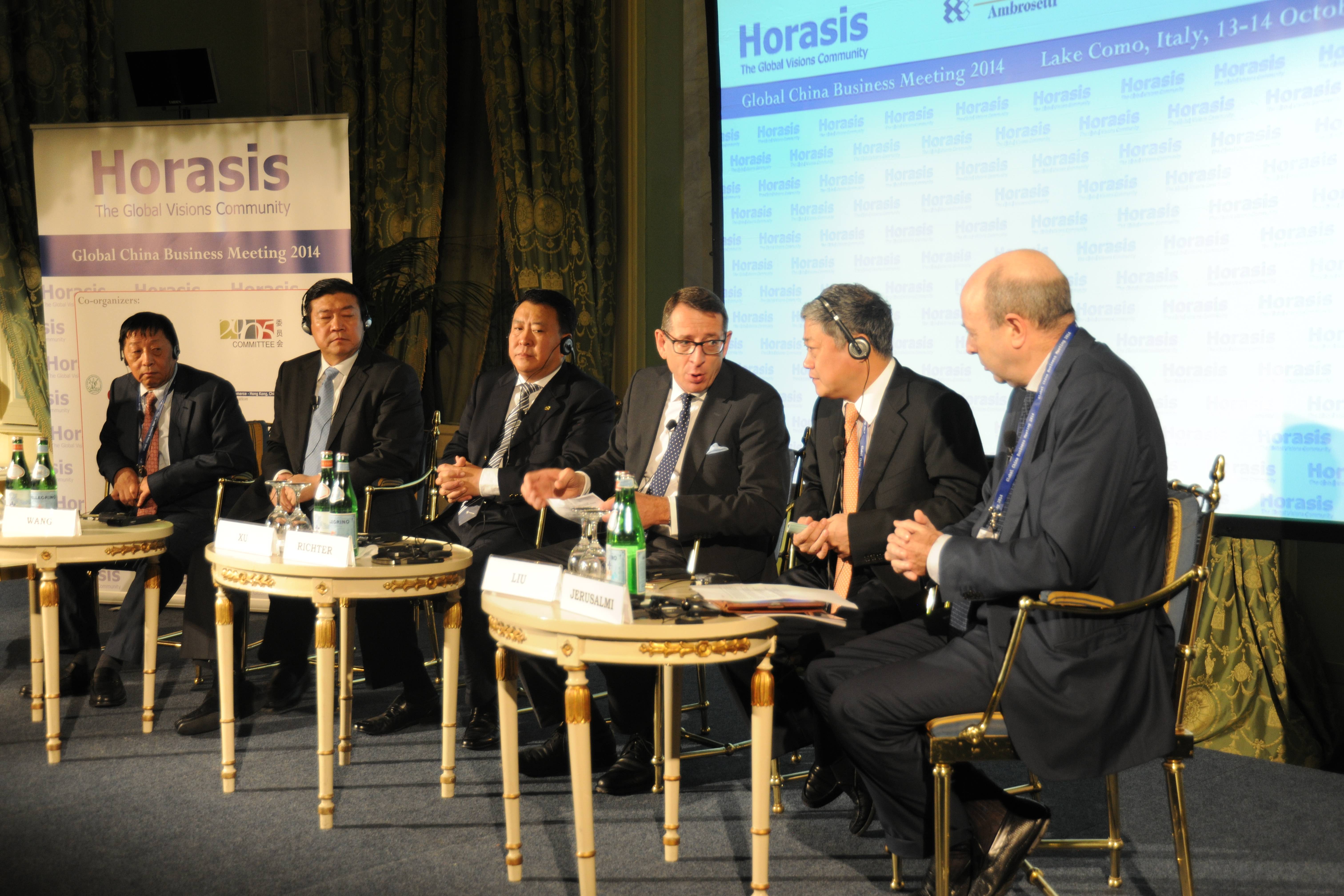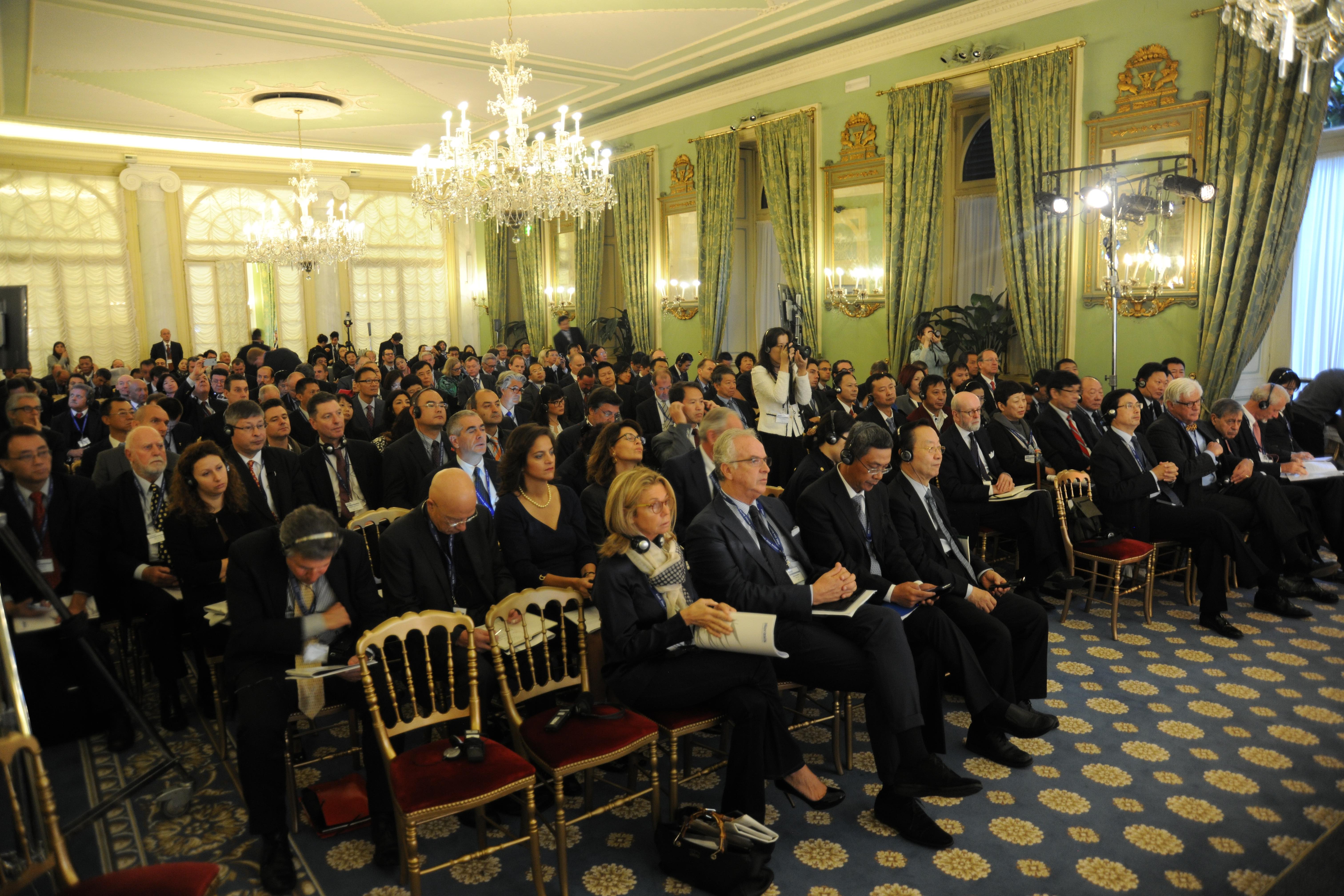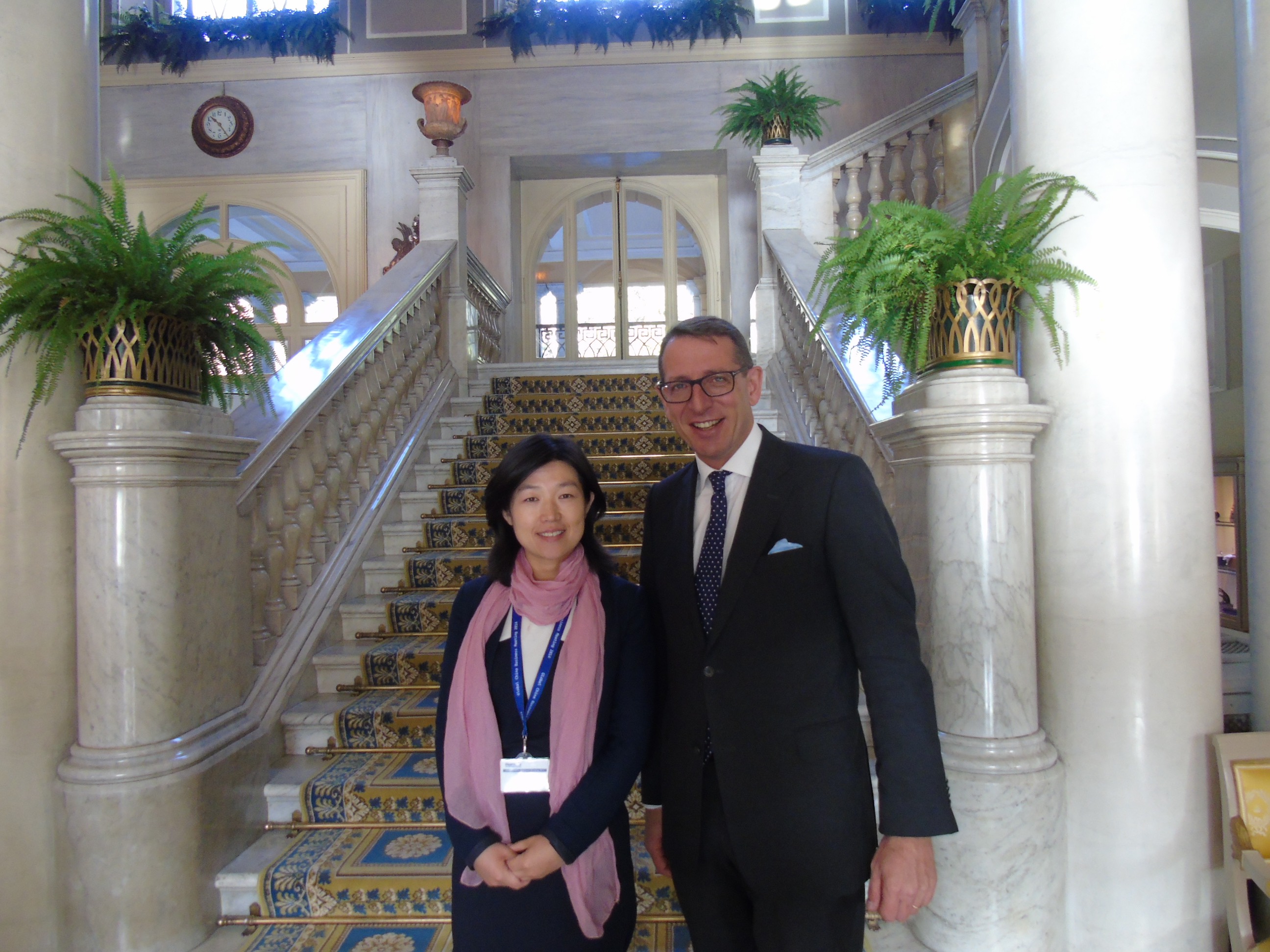A German Expert’s Global Vision on China
Dr. Frank-Jürgen Richter is Chairman of Horasis: The Global Visions Community, an independent international organisation committed to enacting visions for a sustainable future. Prior to founding Horasis, Dr. Richter was Director of Asian Affairs of the World Economic Forum. As a leading analyst of international business and emerging markets, he speaks globally and influences major business and governmental decisions. Dr. Richter is also an active scholar and has authored and edited numerous bestselling books on global strategy and Asian business, including Six Billion Minds: Managing Outsourcing in the Global Knowledge Economy, Global Future: The Next Challenge for Asian Business, and Asia's New Crisis: Renewal through Total Ethical Management.

-Dr. Frank-Jürgen Richter (Copyright: Dr. Frank-Jürgen Richter)
Dr. Richter, thank you for granting us this interview. As for previous issues of our GCI journal, we are always looking for people who have a connection, a story with China, an extensive experience, influence or insights to share with us. We are thrilled to have you as a guest for this Feature Interview. Could you share with our readers your very first story with China?
Richter: I travelled on the Silk Road for a few months during the early 1990s, after having lived and studied for my PhD in Japan, a period during which I learned to speak Japanese. Towards the end of my trip, I spent three months in China and explored the Chinese western provinces. I couldn't speak one word of Chinese, but I was able to communicate by writing down the Chinese characters I had learned in Japan. The people I met along the way were thrilled by my way of communicating. I decided during this trip to learn Chinese properly and focus my attention on China. It was this particular trip - virtually a survival trip – that triggered my decision to return to China.
Later, after joining a German multinational firm and having worked at their headquarters for two years, I was sent over to China at a rather young age - I was one of the youngest expatriate managers the company ever had - to work as the firm’s Chinese Chief Finance Officer (CFO). Before moving to China, I judiciously took a one-month intensive language course at Nanjing University (南京大学). My task in Beijing (北京) was to establish a holding company for the firm's various joint ventures and to pursue investing in new joint ventures. It was a great time for me. When I came to Beijing in 1996, China’s economic boom was gaining momentum: this was the age of the ‘Chinese gold rush’ with double-digit growth. I absorbed Chinese culture during my stay of four years, which convinced me that China would become the world's economic superpower.

-10th Horasis Global China Business Meeting, Opening Plenary (Copyright: Dr. Frank-Jürgen Richter)
Your name, Frank-Jürgen Richter is always directly associated with Horasis. What does Horasis mean? What is behind your initiative to organise the Horasis Global China Business Meeting?
Richter: Horasis in Chinese is欧亚思: Ou (Europe) Ya (Asia) Si (thoughts). Or in other words: connecting the East with the West. This is my present driving force: to be able to get East and West to communicate and to change their thinking.
I worked for the World Economic Forum for a couple of years, after returning from my assignment in Beijing. As Director of Asian affairs, I was in charge of the Forum's Asia-related activities, including their annual China Summit held in Beijing. When I left the World Economic Forum in 2004, the China Federation of Industrial Economics approached me and asked if I could organise a meeting similar to the World Economic Forum's China meeting by using a mirror-image format. The gathering was not intended as a service for foreign firms entering China to invest or to understand the Chinese regulatory and business environment, but rather as a service for Chinese firms wanting to enter Europe, to understand what's happening here, and to start investing in Europe. This gave birth to Horasis and its guiding principle of exchanging knowledge. Our first Global China Business Meeting was held in Geneva in 2005. It was an immediate success.
On 13-14 October 2014, you held the tenth Horasis Global China Business Meeting in Italy. Was this annual meeting fruitful? What was the outcome of this meeting?
Richter: I think that my overarching impression after this meeting is that China knows where it is going. The delegates were not dismissive of the media’s remarks about border skirmishes, but confident that these aspects would be resolved. Importantly, it was observed that China had spent huge sums on infrastructures over the past years – new safer roads, high speed passenger railways – and had not ignored its freight routes by rail and river.
The delegates came to an overall unanimous conclusion that China’s economic growth is robust, but slowing down. This, in a sense, echoes the recent International Monetary Fund (IMF) global meeting, which downgraded most of the world economies except China (and as they stated: ‘not yet’!). Clearly, China is entering a new phase of its development towards greater internal consumption while currently, the rest of the world is demanding less Chinese goods. It is also clear that China is looking to innovate more, focusing on a faster economic development pattern while looking for social stability. Finally I noted that China and the world need to deepen their policy exchanges to share expertise, to learn from each other and build greater global cooperation.
Looking back over 10 years of development, how do you describe the changes in China?
Richter: In essence, the last ten years have seen a transition from headlong growth to a more nuanced development promoted by the Chinese government and its many ministries, as well as regional development fora. If we look at how many people travel by rail during national holidays, it is a massive number. Most people seem to make their journey unscathed, yet in the winter there are delays of course, and the press considers this newsworthy. But now China has well over 10,000 kilometres of very high-speed rail lines able to transport passengers across the country in twelve hours – an unimaginable feat a few years ago. China has also increased the construction and renovation of roads on a similar scale, making these journeys both faster and safer by separating the traffic into different lanes, and even in some cases creating unique roads solely for coal transport.
The great social experiment is yet to come, I think. Across the world there is a natural urge by people to move from the countryside to the city. There are more attractions in the city for the young and more social care available for the elderly. The government has noted this transition phase and built many new cities, often close to the new rail and road links, and is confident about its ability to manage a shift of 400 million people from their rural abodes to cities within the next 20 years. There is a confidence in their infrastructure development that will absorb population growth and give people a new meaningful life.
At the same time, the government has seen the need to promote growth through port activity. Not only in the coastal regions that are now better connected by new port structures to the rest of the world, but also inland using river and rail links to move raw materials and finished goods effectively to these new ports. In this way, the massive holiday traffic flows will be reduced, costs and travel hardships will be reduced, and many more people will live in far better accommodation than before. It’s about uplifting the quality of life in China. I don’t need to say more!

-10th Horasis Global China Business Meeting, Lake Como, Italy (Copyright:Dr. Frank-Jürgen Richter)
Every year you choose a different venue for the meeting outside China. Why not organise the meeting in China?
Richter: We usually receive an invitation from a host government to stage the event. We then decide on the location in close coordination with the China Federation of Industrial Economics. It is well known that our Chinese participants want to travel and explore the world – and for many reasons. If the meeting was held in Beijing or Shanghai (上海市) the gathering would have a different character. Many Chinese entrepreneurs regard the Global China Business Meeting as an important activity in their annual schedule – and many participants come back year after year. One of the primary reasons for choosing a place outside the focus country is that participants can discuss more freely issues from ‘back home’. And this provides a neutral ground for others to discuss the potential for joint operations, such as a Brazilian discussing with a Chinese manager in Lake Como (Italy) some form of joint cooperation. What is more natural and easier than that? This is psychology that is very humanly oriented – we all talk more freely to a stranger, even a computer, than to a family member if we wish to discuss personal matters. It is the same with these China-oriented meetings. In fact I use the same rationale in organising my other meetings concerning the Russian and Indian groups: travelling not only broadens the mind, it seems to open discussions in the conference panels, during coffee and dinner, even in nearby bars and cafes as people take little discussion trips.
I attended the Horasis Global China Business Meeting in The Hague (2013) and the one in Lake Como Italy (2014) and each year I found that the topics were really cutting edge and challenging for the participants, along with a great balance and wide coverage of different fields and aspects. How do you come up with such wonderful programmes every year?
Richter: Well a lot of brainstorming goes into the programme. I travel to China several times per year, asking our members and participants about the next hot topics. Likewise, I ask our foreign participants about their views. So making the programme is a year-long process. But it can’t be finalised until just before the meeting, as I have to ask delegates to be panel members to discuss one of the many topics that have been raised. The difficult balance is in achieving topicality with enough depth, while also resisting the more simple trendy and ‘newsy’ items. At the same time, some topics deserve repeated airing as they are globally relevant. Let me give an example: education. Many business leaders worldwide complain that the young people are not sufficiently trained to join their businesses. Even consultants offer the same complaint; among the thousands that apply for a job, only a handful could, in their opinion, be further trained to eventually become global warriors able to help develop multinational businesses and governments. So we see now that China creates millions of graduates per year and few get good jobs. It’s a problem that is not unique to China.
And we find many young people on the streets today feeling resentful towards a society that supported their early life, but within which they paid no heed to getting a good education. This is why ‘education’ is a recurring topic at my meetings, as I invite past and future delegates to suggest new aspects for discussion and to help me gather a panel of discussants. Yes, it is a long process to create the topics for a new conference. Thank you for your observation that the topics were ‘cutting edge’.
Speaking of education, I’m very interested in your training background. And you speak German, French, English, Japanese and Mandarin Chinese, which is impressive in my view. Can you share more stories?
Richter: Actually, I also speak Spanish and Portuguese, ha. My formative education took place in several countries. I am German, so my early schooling was at home in German schools and universities. I studied for a Master’s programme in France and Mexico, then pursued doctoral studies in Japan. I have learned to always observe people’s body language and to listen to their voices – the sounds and intonations of friendship, enquiry, uncertainty or anger – even without knowing the words. This facility has stood me in good stead over the years, especially in my early days in Beijing where I had to really learn Chinese, its nuances and the gestures.
I was always convinced that dialogue (and business) starts with communication - and the mastering of the language of the country I am living in is thus a prerequisite. That's the reason I speak several languages - I lived in many countries and I enjoy absorbing the local culture.
In terms of global vision, what do you expect from China in the next ten years?
Richter: I have already hinted at some of the future developments that may occur in China – further consolidation of the transport infrastructures to open up the more distant regions. This is in keeping with my understanding of their wish to bring more work to the inland regions and thus raise those regions’ economic conditions. But also, such changes better align with a more sustainable future as goods and people have to move less far to link fuels, raw materials, manufacturing transformations into finished goods using local people. The new towns are largely placed near raw resources thus minimise transportation of goods and people.
At the same time, both Chinese firms and European firms are increasingly using rail links between China and Europe rather than shifting finished goods thousands of kilometres to the pacific ports. Sending goods in rail containers makes more sense for speed to market and for sustainability reasons.

-Dr. Liu Jingyi and Dr. Frank-Jürgen Richter
What are the challenges that China must face and what are the opportunities for a sustainable development in China?
Richter: A great issue for China – and not only China but for all nations, though more especially developing nations – is to raise education standards of rural students. In fact, all aspects of the rural world need lifting. It is a well-known moan within the professions that their members are getting older faster in the countryside than in towns. By this they mean that towns are more attractive to younger professional dentists, doctors, teachers, lawyers – all resist rural placement. As a result, the country, the people and their children loose out. This is as true in rural China as in rural France or rural America. So perhaps the new larger towns in China will cure this effect by creating a focus and a metropolitan area that will attract young professionals who will still perform a great service to the community without having to reside in a remote town of 20,000 people.
Because of China’s rapid growth in recent years, it has accrued vast wealth. These funds are being used to buy the latest equipment for China’s developing industries, which will perform well with respect to environmental protection. Again, because of China’s large demand for energy, its need to transform raw materials into semi-finished goods and subsequently to assemble these. Chinese companies strive to work to the highest environmental standards and get many scientists and engineers to focus on novel ways to reduce China’s environmental impact. Yes, China has the world’s largest pollution footprint, but it has the largest task force trying to reduce it. China has not only opportunities to create sustainable development but the will to drive this initiative along as fast as possible.
 Share on Facebook
Share on Facebook Share on Twitter
Share on Twitter Share on LinkedIn
Share on LinkedIn